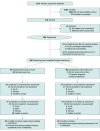Effectiveness of a Multimedia Educational Intervention to Improve Understanding of the Risks and Benefits of Palliative Chemotherapy in Patients With Advanced Cancer: A Randomized Clinical Trial
- PMID: 32672806
- PMCID: PMC7366281
- DOI: 10.1001/jamaoncol.2020.1921
Effectiveness of a Multimedia Educational Intervention to Improve Understanding of the Risks and Benefits of Palliative Chemotherapy in Patients With Advanced Cancer: A Randomized Clinical Trial
Abstract
Importance: Despite requirements of informed consent, patients with advanced cancer often receive palliative chemotherapy (PC) without understanding that the likelihood of cure is remote.
Objective: To determine whether a PC educational video and booklet at treatment initiation could improve patients' understanding of its benefits and risks.
Interventions: Regimen-specific PC videos and booklets presenting information about logistics, potential benefits, life expectancy (optional), adverse effects, and alternatives. Videos featured authentic patients sharing diverse experiences. After receiving treatment recommendations, research assistants distributed materials to patients for independent review.
Design, setting, and participants: Multicenter randomized clinical trial of patients with advanced colorectal or pancreatic cancer starting first-line or second-line PC in 5 US cancer centers with enrollment from June 2015 to September 2017 and follow-up to December 2019.
Main outcomes and measures: The primary outcome was accurate expectations of chemotherapy benefits at 3 months, defined as responding "not at all likely" to "What is your understanding of how likely the chemotherapy is to cure your cancer?" (from the Cancer Care Outcomes Research and Surveillance study). Secondary outcomes included understanding of adverse effects, decisional conflict (SURE test), regret (Decisional Regret Scale), and distress (Functional Assessment of Cancer Therapy-General emotional well-being subscale).
Results: Among 186 patients with advanced colorectal or pancreatic cancer who were starting first-line or second-line PC (94 randomized to usual care, 92 to intervention; mean [SD] age, 59.3 [12.6] [range, 28-86] years; 107 [58%] male; 118 [63.4%] colorectal and 68 [36.6%] pancreatic cancer), most patients wanted "a lot" of information or "as much information as possible" about adverse effects (149, 80.1%), likelihood of cure (148, 79.6%), and prognosis (148, 79.6%). Among the intervention arm, 59 (78%) reviewed the booklet and 30 (40%) reviewed the video within 2 weeks. The primary outcome did not differ between intervention and control arms (52.6%; 95% CI, 40.3%-65.0%; vs 55.5%; 95% CI, 45.1%-66.0%). Accurate adverse effect understanding was more common among intervention than control patients (56.0%; 95% CI, 44.3%-67.7%; vs 40.2%; 95% CI, 29.5%-50.9%; P = .05), although this did not meet the threshold for statistical significance. The intervention did not increase distress, despite frank prognostic information. Other secondary outcomes were similar.
Conclusions and relevance: Provision of an educational video and booklet did not alter patients' expectation of cure from PC. Alternative delivery strategies, such as integration with nurse teaching, could be explored in future studies.
Trial registration: ClinicalTrials.gov Identifier: NCT02282722.


